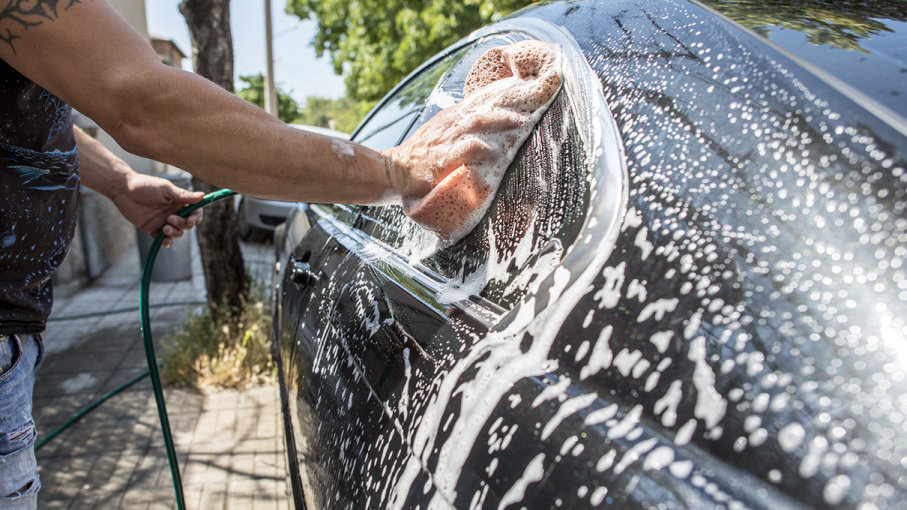How Often Should You Wash Your Car?
CARS 2019/08/23

BY KRISTEN HALL-GEISLER JAN 23, 2018

Your car is a major investment and you spend a ton of money maintaining it — oil changes, tire rotations, brake pads. But have you ever considered something as simple as washing your car as an investment, too? Just how often do you need to do it and how important is it?
Sometimes it's obvious when your car needs a wash. After a long day of driving down a dusty, gravel road, for example. Or when that flock of birds takes aim at your car's hood while you're parked under what you think is an ideal shade tree.
But what about washing your car as part of its general maintenance schedule? Whether you do it to protect the paint and minimize rust so you can drive it forever, or to keep the car in pristine condition for higher resale value later, there are several reasons to wash your car regularly.
How Often Is Enough?
Most experts recommend washing your car every two weeks or so throughout the year as a general rule. If you live in an area with a lot of salt — either from a nearby ocean or from salt trucks on the winter roads — you probably should wash it more, as salt can corrode the metal and cause rust.
Those who spend a lot of time driving through the backcountry should give their car a little more TLC, as well. The aforementioned bird business is acidic enough to eat through your car's paint job if it's left too long. Same goes for dead bugs and tree sap, so they should be washed off as necessary.
Your car can go longer between washes depending if you don't drive it every day, or you keep it in a garage and out of the elements.
And while we might think of car washes as a summertime chore, you actually need to wash your car more often in the winter. Salt from the roads is one of the worst offenders, and it can cake onto the body of your car and wreak havoc. More frequent trips to the car wash, particularly those with hand-held pressure wands, will help protect your car from salt buildup.
Of course, the interior of your car is exposed to less salt and fewer dead bugs, but it still needs to be cleaned. Use a vacuum hose to get any particles (dog hair, dry cereal, bits of dried leaves) out of the seat crevices and off the floor mats. If you find any stains during the vacuuming process, you can use an upholstery spot cleaner to remove them. Dingy seats can be cleaned with a simple solution of warm water and mild detergent.
Leather seats, though, need to be cleaned and conditioned to keep the leather from cracking and aging, at least every three months or so. If you drive a lot (say for a living) or the interior of your car is exposed to the sun, condition the leather every two months.
Waxing and Detailing
Most cars need a good application of wax at least twice a year. You can test whether you need a new coat by splashing a bit of water on your car. If it beads up, you're good. If it doesn't, your car need a good waxing.
Wax does more than make your vehicle shiny and pretty. It also helps those corrosive substances we've discussed — salt, sap, bugs, bird business and more — slide right off your paint. If they don't, the wax at least provides and extra layer of protection between the offending dirt and junk and the paint job.
Finally, one of the best things you can do for yourself (and your car) is get it detailed. Think of it like a meticulous spring cleaning for your car, inside and out. Most detailing jobs cover everything from vacuuming every last inch of the interior to cleaning your car's grille with a toothbrush. Tons of businesses offer this service, and the prices vary, but can range upwards of $100 or more, though you can do much the same process yourself in an afternoon.
While your car might feel and smell clean after a good detailing, it isn't something you have to do very often. A simple wash every two weeks, a wax at least every six months and a basic interior clean-out every few months should keep your car (and investment) in top-notch shape.
NOW THAT'S CLEVERThe most eco-friendly way to wash your car is at a car wash, where the runoff will be captured and treated rather than entering storm drains and eventually nearby streams and rivers. But if you're going to wash your car at home, pull onto the lawn. As long as you're using mild, biodegradable soap — which is gentle on your car's paint anyway — you can give your grass a drink on a dry summer day.